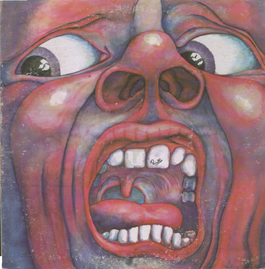10.31.07
home | north bay bohemian index | music & nightlife | band review

TRIPPY: Legions burned this King Crimson image into their stoned brains decades ago
Lyrics Born
Those who wrote the words
By Bruce Robinson
T he world of rock and roll is (you should pardon the term) studded with gifted visionaries and/or obsessive egomaniacs who not only write songs and sing them, but also play several instruments and produce the sessions, too. This article isn't about them.
No, our purpose here is to celebrate the specialists who deal exclusively with words, whose lyric vision complements their colleagues' instrumental and melodic talents so aptly that they blend into a seamless, holistic creative merging.
In the broader world of popular music, it's easy enough to find such precedents as Ira Gershwin, Oscar Hammerstein or W. S. Gilbert, but among rockers, the prototype for these rare writers has to be Keith Reid, without whom Procul Harum would never have "tripped the light fandango."
Although he never appeared onstage with the band and never played a note on any of their albums, Reid has been a full-fledged member of Procul Harum since the band's inception (an early press release described the group as "five musicians and a poet-in-residence"). He provided the lyrics to all of their original material (save a pair of instrumentals, naturally), and is usually simply credited with contributing "words."
Reid's writing is evocative and often surreal in its imagery, a curious vehicle for the richly authoritative vocal stylings of Gary Brooker, Procul's pianist and primary composer. Reid also co-wrote fairly often with guitarist Robin Trower, more extensively after he went solo. The Brooker-Reid partnership has endured for 40-plus years, and their early chart-topping collaboration "A Whiter Shade of Pale" may be the most widely covered English pop song not written by a Beatle.
Pete Brown was already a published poet in 1966 when he was recruited to try writing songs with Ginger Baker, who was trying to come up with original material for a new blues-rock trio he was part of called Cream. The two never clicked, but Brown unexpectedly found a strong creative rapport with the band's bass player. (Ironically, Bruce's wife, Janet, proved a more successful collaborator with Baker.)
Brown's partnership with Jack Bruce not only generated some of Cream's best-known songs ("White Room," "I Feel Free," "Politician" and, with Eric Clapton, "Sunshine of Your Love"), but also provided material for most of Bruce's post-Cream recordings. Interestingly, at least for the purposes of this article, when Bruce and Robin Trower teamed up for the 1981 album, Truce it featured songs by both Bruce/Brown and Trower/Reid.
Pete Sinfield was a founding member of King Crimson—he also came up with the name—having been in earlier bands with co-founder Ian McDonald. He soon found his musical abilities eclipsed by others in the group, but Sinfield's literary gifts ensured his continued participation through their first four albums, most conspicuously on the King Crimson debut, In the Court of the Crimson King.
Following a falling out with guitarist Robert Fripp, Sinfield began working with former band-mate Greg Lake who had moved on to form Emerson, Lake & Palmer. He provided lyrics for Lake's "I Believe in Father Christmas" and numerous other ELP tracks, as well as co-writing with ltalian prog-rockers PFM, who were also signed to ELP's vanity label, Manticore. Sinfield also mustered a obscure 1971 solo disc, Still, which he has recently reissued.
Renaissance was a capable, moderately successful progressive rock ensemble from the same era, perhaps most noteworthy for the blissfully assertive vocals of Annie Haslam. But it was another woman, Betty Thatcher, who provided their lyrics. In an unusual process, composers Jim McCarty (the former Yardbird) and later, Michael Dunford, would send Thatcher their music on tapes and lead sheets, and she would compose lyrics to fit and mail them back to the band.
Finally, on this side of the Atlantic, we come to Robert Hunter, who became Jerry Garcia's primary lyric collaborator, although he wrote with other members of the Grateful Dead as well. From "Dark Star" to "Touch of Grey," he provided the words for many of the Dead's best-loved songs, including the signature phrase "What a long, strange trip it's been." Although Hunter performed with some early incarnations of the Dead (he was also briefly part of New Riders of the Purple Sage), that did not carry over into the band's heyday. However, Dead members are prominently featured on Hunter's several solo discs.
In subsequent years, the path these pioneers carved out was followed by the likes of Bernie Taupin and Tim Rice. But we mustn't hold that against them.
Send a letter to the editor about this story.
|
|
|
|
|
|